Politics
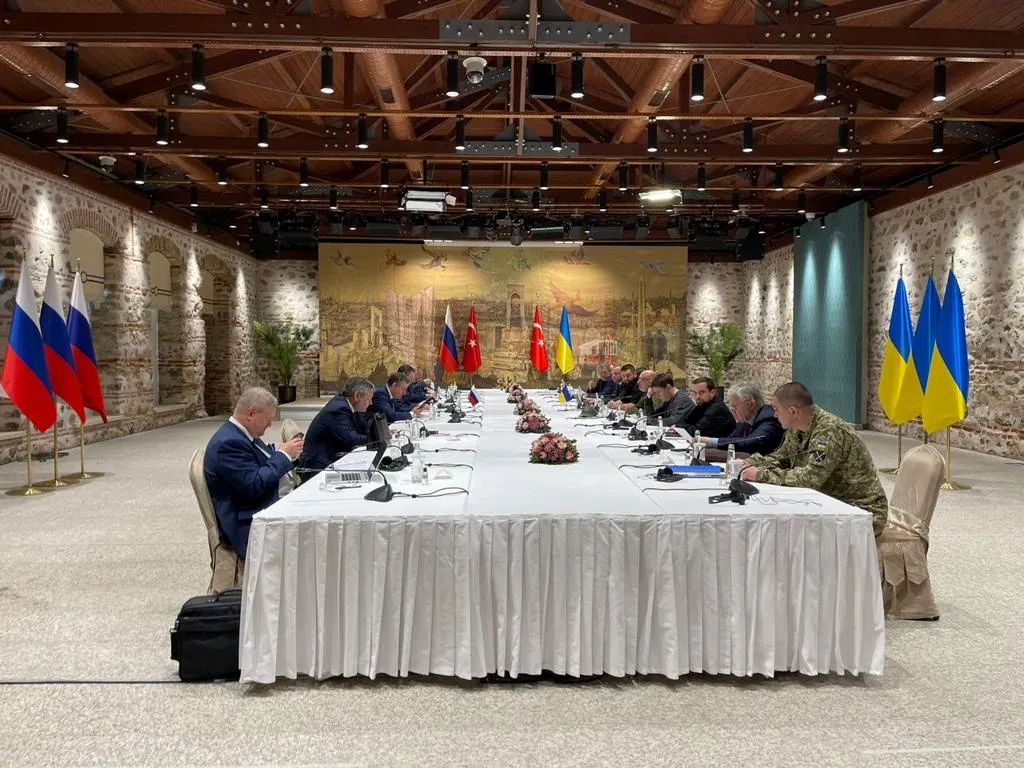
Politics
28
Istanbul Chaos: How the Kremlin Dictates the Pace of Peace Negotiations
ISTANBUL — In the majestic halls of the Dolmabahçe Palace, where once the fate of empires was decided, a new drama is unfolding today: peace negotiations between Ukraine and Russia, the first in three years, are drowning in chaos carefully orchestrated by the Kremlin. Hundreds of journalists buzzing like a hive near the Bosphorus, diplomats hurriedly rewriting plans, and leaders balancing on the edge of hope and disappointment — all this seems to play into Moscow’s hands. As CNN’s chief international security correspondent Nick Peyton Walsh reports from Kyiv, “The Kremlin got exactly what it wanted, and the White House appears to be able to do little about it.”Photo: Getty ImagesChess on the Bosphorus: Putin Holds a PauseThe world held its breath for three days, waiting to see whom Russia would send to Istanbul. President Vladimir Putin’s refusal to personally participate in the negotiations he proposed was not just a diplomatic maneuver but a masterstroke that left everyone in suspense. Instead of himself, Putin sent a second-tier delegation headed by Kremlin aide Vladimir Medinsky, whom Ukrainian President Volodymyr Zelensky called “decorative.” “This isn’t negotiations, it’s a performance,” Zelensky stated in Ankara, standing next to Turkish President Recep Tayyip Erdoğan, whose neutrality in this war is increasingly cracking.Putin’s decision, which analysts describe as “a well-calculated risk,” worked flawlessly. U.S. President Donald Trump’s response was exactly what the Kremlin expected: “Nothing will happen until I meet with Putin.” These words, spoken aboard Air Force One en route to Abu Dhabi, dashed weeks of diplomatic efforts and shifted the focus to a hypothetical bilateral meeting between U.S. and Russian leaders. “Putin has a blank check,” Walsh notes. “He can buy time until Trump takes the next step.”According to insider information, frustration is mounting in the White House corridors because Trump seems to allow Putin to dictate the pace. Sources close to the administration say that Trump is considering a meeting with Putin in the near future, possibly on neutral territory like the Persian Gulf. But there is no urgency for Moscow. Having tested the limits of threats with “strong sanctions” from France and other European allies of Ukraine, Putin is convinced: the West is divided, and Trump is his best trump card.Zelensky in a Trap: Gesture for TrumpFor President Zelensky, Istanbul became a test of political acrobatics. His decision to send a delegation led by Defense Minister Rustem Umerov to Turkey was motivated less by confidence in the success of negotiations and more by the necessity to maintain Trump’s support. “Kyiv must demonstrate readiness for any steps for peace,” Walsh writes, “otherwise pro-Kremlin voices among Trump’s circle will intensify, and support for Ukraine may diminish.”This is delicate balancing. Zelensky, who arrived in Ankara for a meeting with Erdoğan, deliberately avoided Istanbul so as not to appear as waiting for Putin’s mercy. But his presence in Turkey is a signal to Trump: Ukraine is ready to play by his rules, even if it means participating in negotiations with a “decorative” Russian delegation. “This is a gesture of respect to President Trump,” Zelensky openly declared, emphasizing that his main goal is to keep the U.S. in the game.However, this strategy carries risks. In Kyiv, according to sources close to the Presidential Office, there is growing concern that concessions in rhetoric or the format of negotiations could be perceived as weakness. The Ukrainian delegation in Istanbul received a clear mandate: to insist on a 30-day ceasefire, the return of children abducted by Russia, and full prisoner exchanges. But without Putin’s participation, these demands sound like a cry into the void.Chaos as a Weapon: The Kremlin Plays on NervesCNN journalist Claire Sebastian, reporting from Istanbul, describes the scene near Dolmabahçe Palace as “a theater of the absurd.” Two hundred journalists, dozens of cameramen, and no clarity: who will come, when, and whether negotiations will even begin. “Expecting the best rather than knowing the outcome,” cynically remarked Stanislav Ivashchenko, correspondent for the Russian publication Zvëzda, referencing war weariness but also emphasizing Moscow’s unwavering stance.This chaos is not accidental but strategic. Putin, having proposed negotiations in Istanbul after the West’s ultimatum for a 30-day ceasefire or new sanctions, chose the “third way,” which allows him to maintain control. Resuming talks at the same location and with the same people as in 2022 is not just symbolism but a signal: Russia will not concede. “Putin is in no rush,” Sebastian notes. “He keeps everyone on edge as his forces advance in Donbas.”The Russian delegation, led by Medinsky, has no authority for serious decisions, which deepens skepticism. “We came for serious talks, but the Russians are making demands,” an anonymous Ukrainian diplomat stated, accusing Moscow of stalling. The Kremlin, in turn, blames Kyiv for “theatricality,” creating a smoke curtain that hides its own manipulations.Trump and Putin: The Dance of Two LeadersAt the center of this chaos is Donald Trump, whose unpredictability adds volatility to the negotiation process. His statements that “nothing will happen” without his meeting with Putin not only play into the Kremlin’s hands but also put Ukraine in an uncomfortable position. “Trump wants an agreement he can sell as a victory,” a State Department source explains, “but he underestimates how long Putin intends to play the long game.”Russia, on its part, is closely monitoring every word Trump utters, hoping for a reset in relations. Diplomatic circles report that Moscow expects Trump, irritated by slow progress, might make concessions, such as recognizing the annexation of Crimea or freezing the front line. For now, the U.S. president maintains suspense, sometimes hinting at a trip to Istanbul and other times saying he will return home.For Ukraine, each day of this diplomatic dance is a test. Zelensky, who a month ago publicly argued with Trump in the Oval Office, now has to demonstrate loyalty to maintain U.S. support. But in the eyes of Ukrainians, who hear air raid sirens every day, these negotiations increasingly resemble a game where Kyiv is not a player but a stake.What Comes Next?While Dolmabahçe Palace remains the arena of diplomatic maneuvers, and the Bosphorus reflects the world's tension waiting for a result, one thing is clear: the Kremlin has taken the initiative. Putin, keeping everyone in uncertainty, strengthens his positions, while Ukraine is forced to prove its readiness for peace before the only audience that matters — Donald Trump. Whether the Trump-Putin meeting will be a breakthrough or just another act in this game depends on who tires first: the White House or the Kremlin. But as one Turkish diplomat ironically noted, “Stambul has once again become the city where we all wait for Gogo.”
16.05.2025

Politics
425
North Korea officially recognizes the involvement of its military in Russia's war against Ukraine
Pyongyang — Taking a step with serious implications for global security, North Korea has officially confirmed for the first time the participation of its military units in combat operations on the side of Russia against Ukraine. This admission, made public through the state agency KCNA, sharply changes the international perception of the war and potentially breaks decades of principles of non-proliferation of conflicts beyond regional influence.
According to the statement of the "Central Military Commission of the Workers' Party of Korea," North Korean troops operated in the Russian Kursk region, notably participating in the so-called "liberation" operation of territory from Ukrainian defense forces. It is known that the decision to send a military contingent was personally made by North Korean leader Kim Jong Un, citing "an analysis of all circumstances" and the provisions of the strategic partnership treaty with Moscow, signed last June.
Despite attempts by Pyongyang to justify its involvement under the UN Charter, analysts consider this a blatant violation of international law. The official statement emphasizes that North Korean troops operated exclusively on Russian territory, but the scale of involvement — and its consequences — remains a subject of debate among global experts.
Silence Exploding with Losses
While the exact numbers of the DPRK military contingent are unknown, Ukrainian military intelligence indicates significant casualties among North Korean soldiers. According to Ukrainian officials, during the assaults on Ukrainian positions in December 2024, over 3,000 North Korean soldiers were killed or wounded in the Kursk region alone. President Volodymyr Zelensky updated these figures in January 2025: over 4,000 killed and wounded.
Reports from Ukrainian intelligence paint a disturbing picture: Russian forces are attempting to conceal losses among allies, notably by burning the bodies of fallen North Korean soldiers to prevent their identification.
Additional evidence — intercepted conversations by the Security Service of Ukraine — indicate that wounded North Koreans receive treatment in better conditions than Russian soldiers. Hospitals in border areas have even reprofiled wards specifically for caring for DPRK military personnel.
Political Signal in Stone
According to North Korea, preparations are underway in Pyongyang to install a monument honoring the "combat feats" of its soldiers on Russian land — a step that not only symbolically reinforces the new level of alliance between the two isolated regimes but also signals Pyongyang’s readiness to deepen integration into Moscow’s military campaigns.
The official Seoul promptly condemned North Korea’s statement. South Korea’s Ministry of Foreign Affairs described it as a "serious violation of international law" and called on the global community to take strict measures.
Shadow Army
According to expert assessments, North Korea has sent about 10–12 thousand military personnel to cover Moscow’s mobilization gaps caused by exhausting combat in Ukraine. However, according to Pavel Lakychuk, a security expert, these forces can only compensate for Russian losses for a very short period.
Reports also indicate low combat morale among North Korean soldiers, especially due to fear of Ukrainian drones, which effectively target clusters of military equipment and personnel.
Challenge to the International Order
The integration of North Korean forces into Russia’s war against Ukraine raises new questions for the international community about the effectiveness of existing sanctions and the possibility of further military support exports by other authoritarian regimes. It also complicates any diplomatic efforts on the Korean Peninsula and risks involving new actors in an increasingly wider and unpredictable conflict.
While the world closely monitors the fighting in eastern Ukraine, this new development indicates that the battleground is no longer limited to regional forces — it is increasingly becoming a global theater of ideological and interest-based conflicts.
28.04.2025
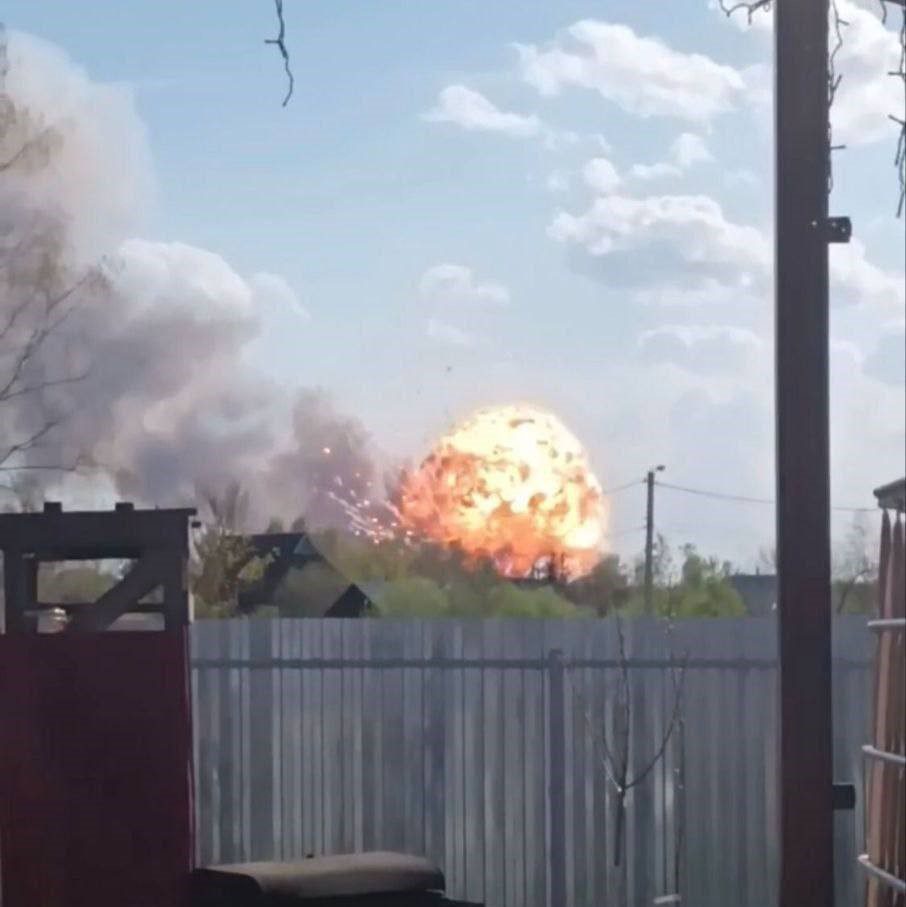
Politics
398
Explosion at ammunition depot in Russia: extensive evacuation and emergency situation
In the second half of the day on April 22, a powerful explosion occurred on the territory of a military facility near the village of Barsovo and the city of Kirzhach in the Vladimir region of Russia. The explosion took place at one of the largest missile and artillery storage arsenals of the Russian Ministry of Defense — the so-called 51st Arsenal of the GRAU.
Authorities Confirm the Incident
The governor of the Vladimir region, Alexander Avdeev, confirmed the fact of the explosion in his Telegram channel, noting that "relevant services are working at the scene," but did not specify the exact location of the event.
Russian media and Telegram channels reported the beginning of the evacuation of residents from settlements near the arsenal. People are being temporarily accommodated in Kirzhach. The Russian EMERCOM declared a state of emergency in the area of the incident.
Reasons and Official Version
According to official information from the Russian Ministry of Defense, the detonation of munitions occurred as a result of a fire on the territory of the military unit. The agency reports that there are no casualties. A special commission has been established to clarify the circumstances, which is to determine the causes of the event and the individuals responsible.
Strategic Facility Under Threat
The 51st Arsenal of the GRAU is a key facility of Russian defense infrastructure. It is located approximately 60 km from Moscow and about 550 km from the Ukrainian border. The total area of the site is nearly 3.5 sq. km, allowing the storage of up to 270,000 tons of ammunition in 45 bunkers and on 30 open sites.
According to Andriy Kovalenko, head of the Center for Countering Disinformation under the National Security and Defense Council (NSDC), more than 100,000 tons of various types of weapons were stored at this arsenal, including rockets "Iskander", "Kinzhal", "Point-U", S-300 and S-400 missile systems, as well as munitions for rocket salvo systems — "Grad", "Smerch", and "Uragan".
Analysts: Attack Could Have Been Extremely Complex
Specialist military commentators from Defense Express suggest that the nature of the explosion indicates a probable detonation of munitions with solid fuel charges. In their opinion, striking such an object, which is under a dense air defense umbrella of the metropolitan region, is a complex task. Officially, Russia has not declared an attack by drones or missiles, leaving room for versions about alternative methods of attack or possible oversights in the air defense systems.
Kyiv Refrained from Official Comments
Ukraine has not yet commented on the possible involvement in the explosion at the arsenal in the Vladimir region. At the same time, let's recall that in October 2024, the Ukrainian Armed Forces officially confirmed the damage of another strategic GRAU arsenal — the 67th warehouse in the Bryansk region of Russia. There have also been reports of explosions at arsenals in Volgograd and Tver regions.
22.04.2025

Politics
167
Will Ukraine be left without US support in the peace process? Europe is alarmed by Rubio's statements
The United States may cease participation in the peace process regarding the end of the war in Ukraine — this was stated by U.S. Secretary of State Marco Rubio, causing concern among European allies. The comments from the American official are perceived as a signal of pressure on Kyiv to activate peace negotiations.
According to international media reports, Rubio made these statements on April 18, emphasizing that the United States may abandon its mediatory role if significant progress is not achieved in ending the war in the near future. In a private conversation with allies, the Secretary also conveyed President Donald Trump’s frustration over the deadlock that the peace negotiations have reached.
“The President believes he has already spent enough time and energy on this. There are many issues in the world that require our attention,” Rubio stated.
The statement came after a phone conversation between the Secretary of State and NATO Secretary General Jens Stoltenberg, as well as on the eve of a series of meetings in Paris, where representatives of the USA, France, the UK, Germany, and Ukraine discussed possible formats for future peace agreements.
Three European diplomats present at the meetings believe that Rubio’s rhetoric was primarily directed at the Ukrainian side and interpret it as an attempt to exert diplomatic pressure on Kyiv. One of them noted that the American official did not express similar criticism towards Russia, avoiding calls for Moscow to demonstrate constructiveness.
Representatives of the Ukrainian government, commenting on the situation, stated that such statements could indicate a shift in Washington’s position, which previously was more consistently aimed at supporting Ukraine in its fight against aggression. A source close to the Ukrainian delegation suggested that Rubio and other high-ranking officials of the Trump administration are under internal political pressure and are outwardly transmitting it — particularly to allies in the anti-Russian coalition.
Despite Kyiv’s firm public stance that compromises with the aggressor under its conditions are impossible, these signals from Washington are being perceived in Ukraine with concern. Analysts point to the risk that the U.S. might change the tone of its support or, in the worst case, reduce activity in diplomatic efforts to advance Ukrainian interests.
So far, Rubio has not specified any clear timelines or conditions under which the U.S. would exit the negotiation process. However, the overall message of his speech prompts European partners and the Ukrainian side to consider the future of the diplomatic front in the confrontation with Russia.
Let us recall that Washington has repeatedly emphasized that any peaceful settlement must take into account Ukraine’s position and be based on international law principles.
19.04.2025
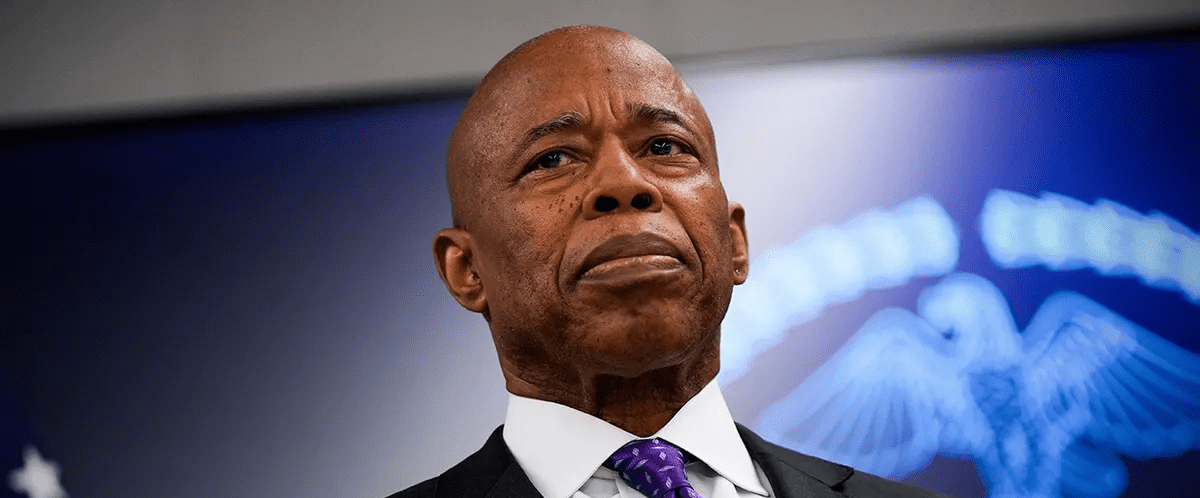
Politics
335
Second day of the New York City mayoral race: unexpected turn of Eric Adams and the political battle of the year
The political arena of one of the most influential cities in the world was shaken on Thursday morning when current New York City Mayor Eric Adams announced his decision to leave the Democratic Party and run for a second term as an independent candidate. This move, made just a few hours before the deadline to submit documents for the June primaries, dramatically changed the dynamics of the election race.
Unusual strategy in response to a crisis
After a prolonged period of legal uncertainty related to corruption charges, Mr. Adams has just won a court postponement in his legal case, which significantly eased his situation. Instead of continuing the fight within the Democratic Party, he unexpectedly decided to take a different path. At dawn on Thursday, at 6 a.m., he announced that he would no longer participate in the Democratic primaries and would run as an independent candidate in the fall.
This decision sparked a real storm in political circles. His explanation was a desire “to be realistic” and “to give New Yorkers the opportunity to assess the real achievements of his administration.”
Opponents’ reaction: from campaign reformatting to debate challenges
Adams’s political rivals did not delay in responding. The well-known D.R.E.A.M. coalition, which previously campaigned against including Adams and former Governor Andrew Cuomo on the ballot, shifted its focus, leaving Cuomo as the sole critic, and now calls itself “Don’t vote for the evil Andrew mayor.”
State Senator Zellnor Myrie, one of the Democratic Party candidates, released a video statement calling himself “an antidote to political chaos.” Other candidates warn that Adams’s withdrawal from the primaries could split votes and weaken Democrats’ chances of victory in November.
Centrist Jim Wolden, another independent candidate, immediately challenged Adams to a debate, emphasizing the need for an open discussion about New York’s future.
Historical context and a complex political mosaic
Although New York has a long history of candidates switching parties and third-party participation, such an unplanned move by Adams is rare. Many experts believe that this maneuver is unlikely to bring him success. His support among New Yorkers is record low, and the city traditionally leans heavily Democratic — with six times more registered Democrats than Republicans.
However, Adams’s decision could lead to an unprecedented scenario since 1977 — a multi-candidate general election. Potential rivals include former Governor Andrew Cuomo, Republican leader Curtis Sliwa, independent candidate Jim Wolden, and candidates from the Left Workers’ Party.
Left coalition and the fight against Cuomo
The left coalition is actively preparing for a possible nomination of its candidate for the general elections. Co-director of the New York Workers’ Families Party, Ana Maria Archila, stated that the outcome of the primaries will influence their final decision. Among the candidates already supported by the party are progressives: Zogran Mamdani, Brad Lander, Adrienne Adams, and Zellnor Myrie.
If Cuomo wins the Democratic primaries, the left party is likely to nominate its own candidate to prevent his victory in the general election.
Sharpton Forum: the first platform for new candidates
On Thursday afternoon, during a forum organized by Reverend El Sharp ton, Eric Adams spoke for the first time as an independent candidate. He focused on racial motivation in criminal prosecution, complained about betrayal by friends, and highlighted his achievements as mayor.
Former Governor Andrew Cuomo, on the other hand, maintained a softer tone, avoiding direct criticism of other candidates but hinting at a readiness to “fight hard against Trump.”
Interestingly, Republican Curtis Sliwa openly expressed joy at Adams’s independent participation in the election. He believes that the division among Democrats gives him a chance to win. “It’s like a basketball Final Four,” Sliwa, founder of the Guardians organization who scored 30% of the votes in 2021 against Adams, said.
What’s next?
Despite the enthusiasm, Adams’s campaign faces serious issues: lack of resources, no clear campaign staff, and refusal to do confirmed TV interviews. Ahead are the collection of necessary signatures to participate in the election and attempts to regain voters’ trust.
His further shift to the right, including flirting with MAGA ideas and support from Donald Trump’s entourage, might repel traditional voters but also attract new ones from the moderate and Republican camps.
New York stands on the brink of a unique election. In a city where political contests are usually decided in primaries, this year’s election cycle could become one of the most unpredictable in recent decades.
06.04.2025
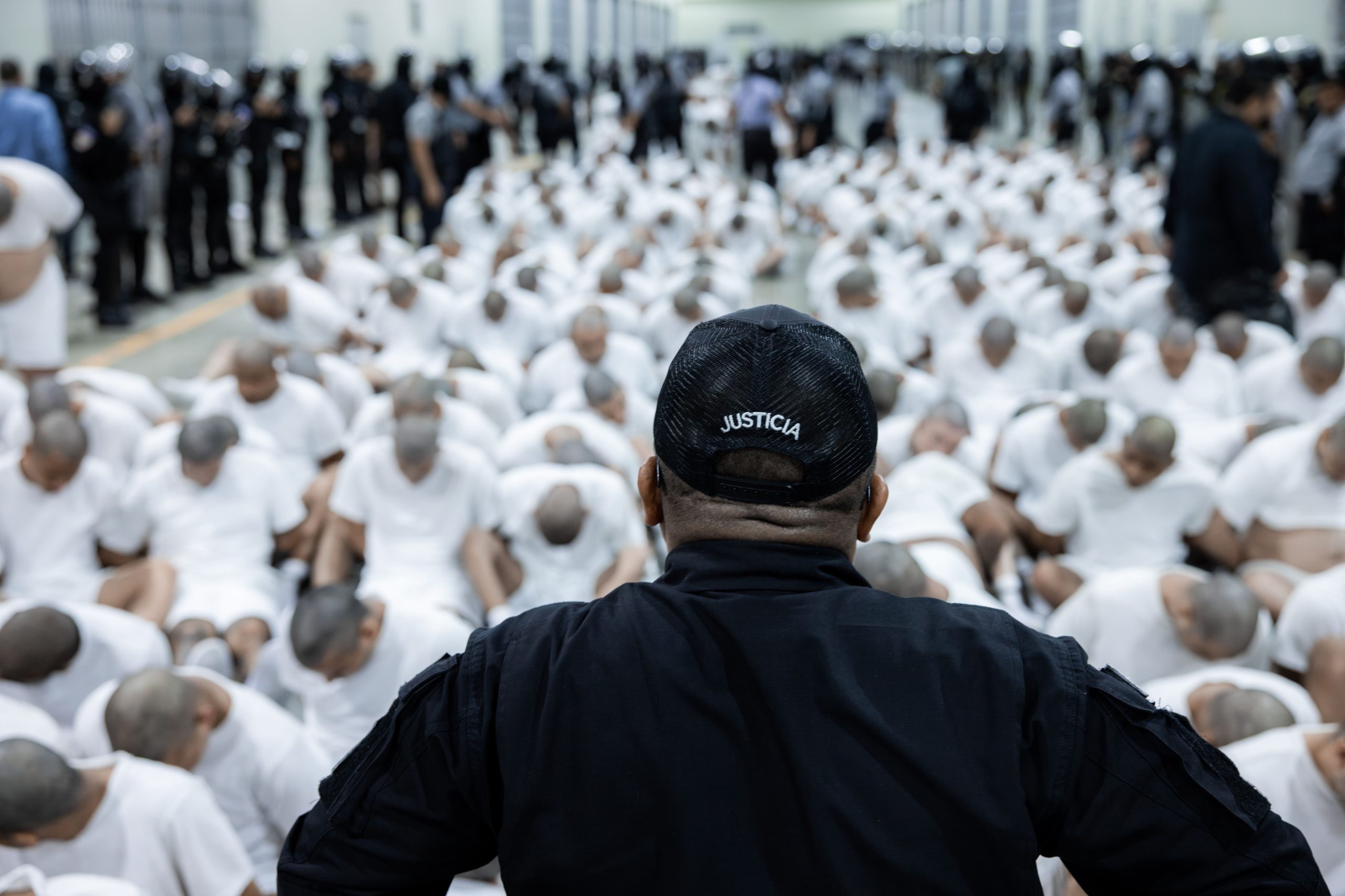
Politics
560
Point-based system for deportation: a new immigration approach in the USA
The Trump Administration intensifies the fight against gangs: the 1798 law is back in effect
In the United States, a high-profile scandal is unfolding related to the deportation of Venezuelans suspected of connections with the criminal group Tren de Aragua (TDA). According to documents filed with the federal court, the Donald Trump administration is applying a so-called point system to determine whom to deport in accordance with the Alien Enemies Act of 1798.
This law, which is 227 years old, was last used during World War II. President Trump referenced it on March 15, after which hundreds of Venezuelans were sent to El Salvador, including to the famous “mega-prison.” Court documents indicate that deportation can be initiated for individuals over the age of 14 who lack citizenship or permanent status in the USA.
How the point system works
The screening process involves evaluating suspects on an 81-point scale. If a person scores 8 points or more, they may be deported. The score consists of five categories:
Court decisions and official documents (15 points) – convictions, indictments, sentences.
Self-incrimination (10 points) – if the individual admits to belonging to TDA, even unintentionally.
Criminal behavior (17 points) – involvement in criminal activities, testimonies from informants or media, suspicious financial transactions.
Documents and communications (25 points) – email correspondence or financial ties with gang members.
Symbolism (14 points) – tattoos, graffiti, gestures, or clothing associated with Tren de Aragua.
Special attention is given to appearance. The US Department of Homeland Security states that individuals wearing Chicago Bulls basketball jerseys with the number 23 (Michael Jordan’s symbol), Jordan “Jumpman” sneakers, or having tattoos with images of trains, AK-47s, watches, or the phrase Real hasta la muerte may be considered potential gang members.
Criticism from experts and human rights advocates
Specialists who have studied Venezuelan criminal groups for over 10 years question the identification methods. Sociologist Roberto Briseño León stated that, unlike gangs in Central America, members of Tren de Aragua do not use tattoos as a means of recognition.
The American Civil Liberties Union (ACLU) filed a lawsuit arguing that the deportation process violates immigrants’ rights because it does not allow them to contest the charges. Federal Judge James Boasberg temporarily blocked the deportation flights, demanding evidence linking the deported individuals to the gang.
Deportation without proper evidence
Despite the court’s decision, over the weekend, the US government handed over another 17 individuals to El Salvador, including seven Venezuelans. Some of them already held refugee status in the US or were awaiting their asylum claims to be processed. Relatives of the deported say that their loved ones were expelled solely based on tattoos, without any evidence of criminal activity.
This situation raises serious questions about the fairness of US immigration policy and possible human rights violations. The US Supreme Court is currently reviewing an appeal by the administration, which seeks to lift the court’s restraining order and resume deportations.
02.04.2025
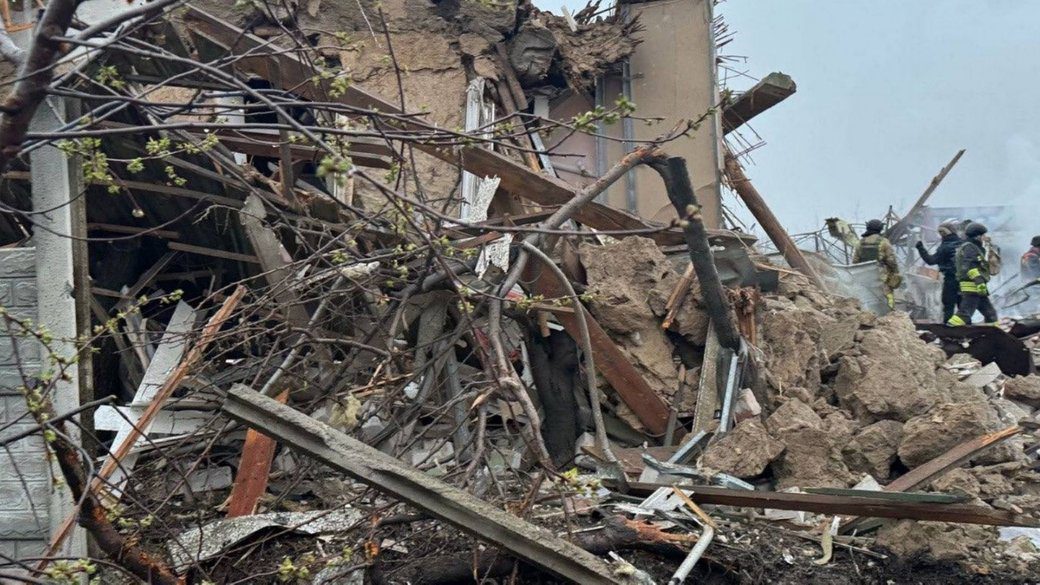
Politics
425
Massive Attacks on Energy Sector: Russia Ignores Ceasefire
Despite the ceasefire regime, the occupiers continue to strike critical infrastructure
Russia repeatedly violated agreements on not hitting Ukrainian energy infrastructure, attacking objects in various regions. This was stated during a briefing by Ukrainian Foreign Minister Andrii Sybiha on April 1, emphasizing the systematic neglect by the aggressor of the agreed-upon commitments.
Strikes on critical infrastructure: which regions were affected?
According to Sybiha, Russia continues to attack energy facilities despite the agreement reached between Ukraine and the USA in Riyadh regarding the inadmissibility of strikes on critical infrastructure.
Specifically, energy facilities in the following regions have been affected by Russian attacks:
Kherson region – the city was subjected to a new attack in the morning of April 1, resulting in 45,000 residents left without electricity.
Kharkiv region – the strikes caused serious damage and disruptions to the power grid.
Poltava region – the enemy attacked one of the important energy supply facilities in the region.
Night attack: Air defense destroyed missiles, but the enemy continues terror
Last night, the Russian army launched a new strike on Ukraine:
From the Zaporizhzhia direction, the invaders launched two Kh-59/69 missiles, which were successfully destroyed by air defense forces.
Also, the enemy actively used guided aerial bombs in Sumy, Zaporizhzhia, and Donetsk regions, continuing the destruction of Ukrainian cities.
Despite violations of agreements, Ukraine continues to strengthen its air defenses and calls on international partners to increase pressure on Russia due to its systematic neglect of any agreements.
01.04.2025
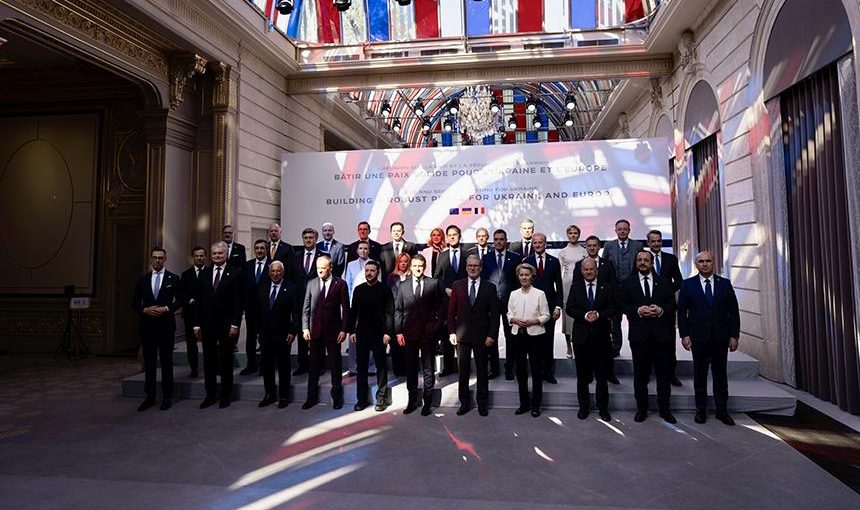
Politics
278
Summit in Paris: Which Countries Are Ready to Participate in Ukraine's Security
On March 27, in the capital of France, the "Coalition of the Willing" summit took place, dedicated to strengthening Ukraine's security, increasing military support, and exploring possible ceasefire mechanisms. Leaders from over 30 countries, as well as representatives of the EU and NATO, participated in the meeting.
Support Coalition: key decisions of the summit
One of the main outcomes of the meeting was the decision to develop a joint proposal within three weeks regarding control over a possible ceasefire regime in Ukraine. Additionally, French President Emmanuel Macron announced the deployment of a French-British military team to Ukraine to develop the future structure of the Ukrainian army.
Among Macron's important statements:
In Ukraine, deterred forces will operate, including military units from several countries. They will encompass maritime, air, and land space.
European allies are considering deployment of military contingents within the framework of long-term security guarantees for Ukraine.
Zelensky: Ukraine needs a comprehensive protection
Ukrainian President Volodymyr Zelensky emphasized in his speech the importance of maintaining a strong army and the necessity of long-term security guarantees.
Main messages from Zelensky:
Ukraine must preserve a powerful army capable of resisting aggression.
"Russia cannot dictate Ukraine the terms of its defense or the number of troops."
"What is needed is not just a one-time aid package, but a 100% comprehensive protection of our sky."
Peace negotiations are only possible if Europe participates, and Kyiv does not consider alternative formats.
Zelensky also emphasized that Europe will be represented in negotiations by Macron and UK Prime Minister Kiri Starmer.
Perspectives of security initiatives: what next?
The Ukrainian leader outlined a number of questions that partner countries need to find answers to:
Which countries will be involved in the security mission in Ukraine?
Where exactly can these forces be stationed?
How will they respond in case of a new escalation?
Will this mission be deployed during a ceasefire, or only after the complete end of the war?
To develop a detailed plan, the possibility of sending an international group of military representatives to Ukraine is being considered, who will work together on its creation.
Europe must defend itself
Before the start of the summit, Zelensky emphasized that Europe must demonstrate its ability to defend its values and security.
"Europe knows how to defend itself. We must prove it," — stated the President of Ukraine.
This meeting in Paris confirmed that European partners are willing not only to support Ukraine but also to actively participate in creating mechanisms for long-term security on the continent.
27.03.2025
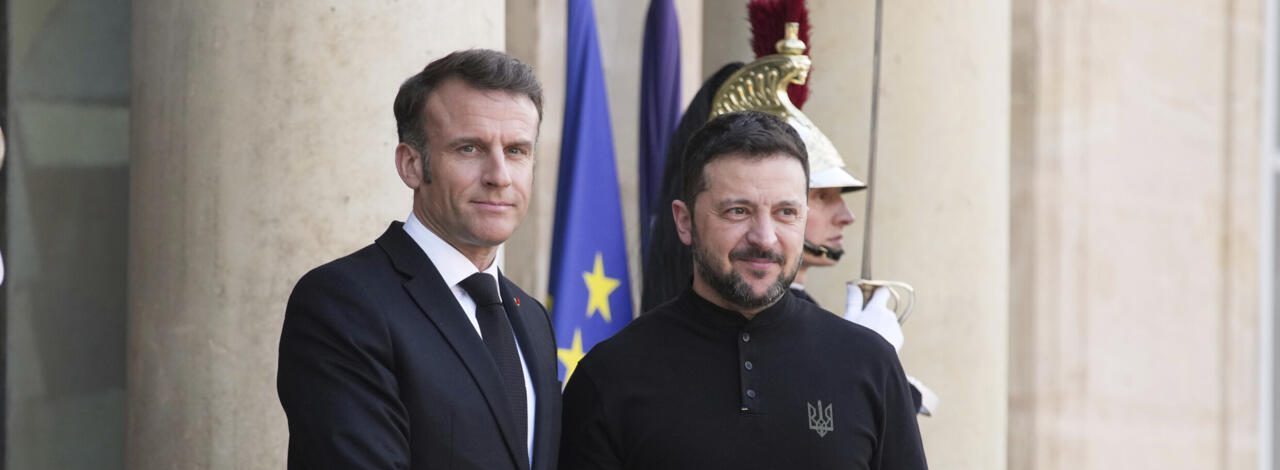
Politics
366
Ceasefire at risk: Russia refuses to halt fire – Zelensky and Macron on the situation
President of Ukraine Volodymyr Zelenskyy met with French President Emmanuel Macron at the Élysée Palace on the eve of the European leaders' summit on Ukraine. During the negotiations, security guarantees for Ukraine, a possible truce, military assistance, and the participation of a European contingent were discussed.
New military aid package from France
President of France announced a new military aid package for Ukraine worth 2 billion euros. It includes:
Anti-tank missiles MILAN
Air Defense Systems ППО
MICA missiles MICA
Aircraft equipment Mirage
Ground defense missiles Mistral
Armored vehicles AMX-10RC
Ammunitions, including remotely controlled ones
Additionally, some military equipment will be produced directly in Ukraine in cooperation with European defense enterprises.
Truce and Russia's position
Ukraine agreed on March 11 to a 30-day full ceasefire without preconditions. However, Russia has not yet accepted this proposal.
Zelensky: "So far, Russia rejects the proposal for complete silence – that is a clear sign."
Macron: "In Jeddah, Ukraine clearly expressed to the USA its agreement to a full ceasefire without any preconditions. We expect the same commitments from Russia."
The issue of ensuring security in the Black Sea was also discussed, where Moscow is trying to impose additional conditions.
Potential involvement of the European contingent
Ukraine is negotiating with European partners regarding the possible deployment of military contingents on its territory.
Zelensky: "Our general staffs have been working for several weeks on the format of the contingent, its quantitative composition, and capabilities. Tomorrow, there will be significant representation from many countries, and the main question is – who is ready for this step."
Macron: "We will not leave Ukraine alone"
The French president assured that support for Ukraine will continue.
"We support a ceasefire at sea and in the air, but Russia rejects it."
"We will not leave Ukraine alone."
"We will discuss how to monitor the ceasefire and work towards a long-term peace."
Additionally, Macron stated that France welcomes the US initiative on ceasing hostilities and will pressure Russia to achieve stable peace.
NazarEdit profile
The meeting between Zelensky and Macron demonstrated the unity of France and Ukraine in countering Russian aggression. It is expected that the "coalition of willing" summit scheduled for March 27 will bring more clarity regarding military support for Ukraine and security guarantees.
27.03.2025